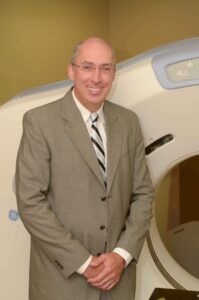When you think of men and cancer, prostate cancer probably comes to mind. But while prostate cancer is by far the most common type of cancer specific to men, it’s important to also know the facts about testicular cancer.
The American Cancer Society estimates that just under 9,500 new cases of testicular cancer will be diagnosed among American men in 2021. That may not seem like a lot in comparison with other types of cancer, but that’s 9,500 lives impacted by cancer.

That’s why April is designated as Testicular Cancer Awareness Month, designed to draw awareness to the symptoms of testicular cancer and what men should watch for. Jeffrey Kovalic, MD, radiation oncologist with the Kirkland Cancer Center, offers some insight.
Defining Testicular Cancer
Testicular cancer is a type of cancer that starts in the testicles, part of the male reproductive system. The testicles, which are two small, egg-shaped glands, are where sperm matures and where testosterone is produced.
Most cases of testicular cancer—90 percent, in fact—are what’s known as “germ cell tumors,” which means they start in the germ cells. Germ cells are the cells responsible for making sperm.
This type of cancer can affect males of any age, but is most common among those between the ages of 20 and 34. While the condition is rare, it’s also very treatable, particularly in its earliest stages.
While researchers haven’t been able to pinpoint many risk factors for testicular cancer, there are a few factors that can increase risk, including a family or personal history of testicular cancer, HIV infection, or an undescended testicle. An undescended testicle means that one or both testicles failed to move from the abdomen into the scrotum before birth. Having this condition makes a man multiple times more likely to develop testicular cancer.
It’s important to note that because there’s no known “cause” of testicular cancer, there’s no proven strategy for preventing the condition.
Detecting Testicular Cancer
Unlike with some types of cancer including colorectal cancer and prostate cancer, there’s no routine screening test for testicular cancer. An examination of the testicles should be a part of routine checkups for men, though.
Because there is no screening or test for testicular cancer, it’s important for males to keep an eye on their health—to know what’s going on down there, in other words. Signs of a testicular tumor can include:
- A feeling of heaviness in the testicle
- A painless lump in the testicle
- Pain or a dull ache in the testicle, scrotum or groin
- Swelling of the testicle, with or without pain
- Tenderness or changes in the male breast tissue
Just as it’s important for women to be familiar with their breast tissue, it’s important for men to know their bodies, too. Regular testicular self-exams can help. If you detect a lump or firm part in a testicle, talk with your medical provider, even if the spot is not painful.
This is especially important—the American Urological Association reports that men wait an average of five months to report signs of a tumor to their medical providers. Time is precious when it comes to testicular cancer, so don’t wait!
How Testicular Cancer Is Treated
If your medical provider believes you may have testicular cancer, he or she will perform a thorough physical exam, likely followed by an ultrasound exam to look for a tumor.
If you’re diagnosed with testicular cancer, it’s important to remember that this type of cancer is incredibly treatable. The five-year relative survival rate for a localized form of testicular cancer is 99 percent, while the overall relative survival rate is 95 percent. The earlier the cancer is detected, the better the outcome.
Depending on the cancer’s staging, treatment may include anything from surveillance of the tumor to surgery, radiation and chemotherapy.
Because fertility can be impacted by many of these treatment options, if you’re looking to conceive a child in the future, talk with your medical provider about options that are available to you, including sperm banking.
If you spot a potential sign of testicular cancer or have other questions or concerns about your health, speak up! Talk with your medical provider about what you’re experiencing. Need a medical provider? Find one here
